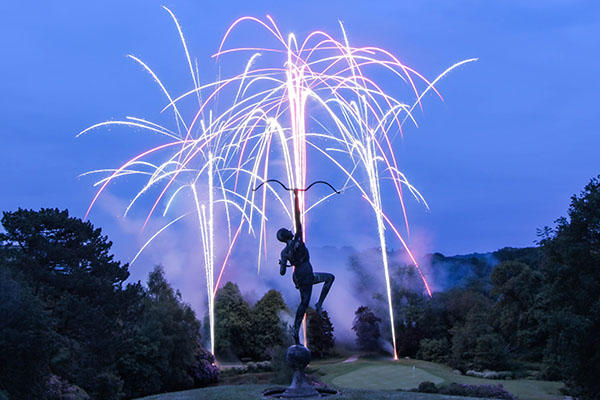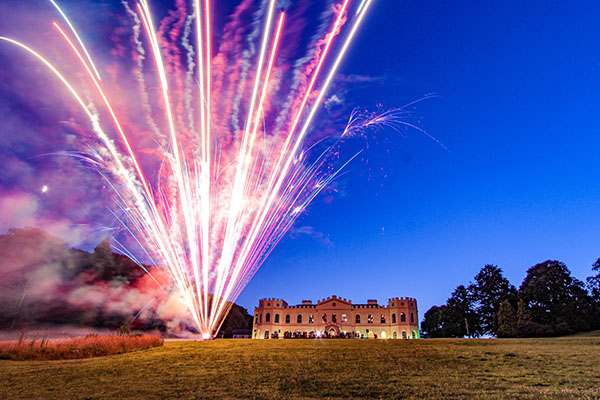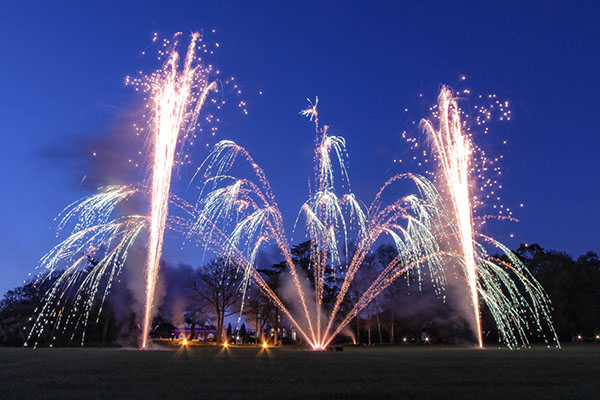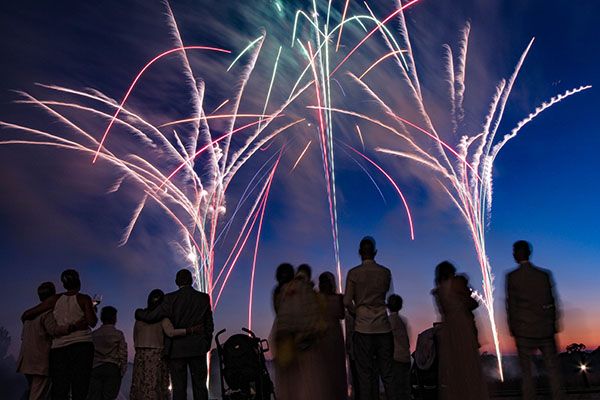
When is it Dark Enough for Fireworks?
A common question we get asked is: when is it dark enough to set off fireworks? The answer lies in understanding the different stages of twilight and how they affect the night sky.
The Three Types of Dusk
- Civil Dusk: This is the first phase of twilight, occurring just after sunset. During civil dusk, the sun is 6 degrees below the horizon. There’s still quite a bit of light in the sky, enough to carry out most outdoor activities without artificial lighting. Fireworks set off during civil dusk can be visible, but they won’t be as bright because the sky isn’t fully dark, though this can be mitigated somewhat if the display is timed to coincide with the very end of this period.
- Nautical Dusk: This phase occurs when the sun is between 6 and 12 degrees below the horizon. The sky becomes significantly darker, and the horizon is no longer visible at sea, which is where this dusk gets its name. Nautical dusk offers a much better backdrop for fireworks, as the colours and effects become more pronounced against the deepening twilight. It’s often the ideal compromise for summer events when full darkness comes very late.
- Astronomical Dusk: This is the darkest phase of twilight, occurring when the sun is 12 to 18 degrees below the horizon. At this point, the sky is as dark as it will get, and the stars are clearly visible. This is the perfect time for fireworks, as the complete darkness allows the full brilliance of the fireworks to shine through, creating a spectacular visual experience.
Fireworks and Light Levels
While astronomical and nautical dusk provides ideal conditions for fireworks, displays can still be fully enjoyable during civil dusk. The key is to have enough contrast between the fireworks and the sky to make the colours and patterns stand out. In the summer months, particularly in the UK, full darkness (astronomical dusk) can come very late, thus, many displays must start earlier.



Lighter skies make to for a nicer photo
The British Fireworks Curfew
In the UK, there is a legal curfew for fireworks. With a few exceptions such as New Year’s Eve, Bonfire Night, Diwali, and Chinese New Year, fireworks must not be set off after 11pm. This curfew means that during the height of summer, when it may not be fully dark until very late, displays often start in lighter conditions.
Summer Firework Displays
Summer firework displays often contend with lighter skies, particularly if the display is oriented towards the west, where the lingering glow of the setting sun can be seen. While this can reduce the contrast of the fireworks, we can still create stunning shows.
Venues may have an earlier curfew than the legal limit, quite often at 10pm, so that disturbance for neighbours is reduced. In this scenario we will have to work with this limitation and dates very close to the summer equinox will have very light skies.
Video Examples of fireworks in different lighting conditions
Civil Dusk: The lightest of conditions
This display probably represents the limit on fireworks fired in early dusk conditions. It was fired at 10pm in Devon on the 23rd June 2023 (close to the summer equinox) into a west facing sky, so the setting sun’s light is behind the fireworks. This is towards the end of civil dusk, that ends around 10.20pm on this day.
This venue has its own earlier fireworks curfew of 10pm, and they only allow Whisper Displays (low-noise, no bangs or whistles). If we were to fire in much lighter conditions than this, we would probably call it a daylight display.
Whisper Display in light skies – June 2023
Below is another example of a 10pm firing time in June, but on an overcast evening, facing into a southern sky.
Whisper Plus Display in overcast skies – June 2021
Nautical Dusk: Summer displays are often fired in this light
This display was fired in Torbay on the same night as the above display, 23rd June 2023, but at 10.45pm into a North facing sky. This is now nautical dusk and is about as late as we will start a fireworks display, to ensure we finish by the legal curfew of 11pm. You can see the lighter sky to the left of the video that is the setting sun’s dimming light in the west.
Corporate Display for the launch of Mecure Paignton – June 2023
Astronomical Dusk: Optimal lighting conditions for fireworks
For most of the year, astronomical dusk starts before or during early evening, therefore there are many options for a firing time.
This display is an example of a summer display that hovers right on the start of astronomical dusk. It was fired in Devon on the 5th August 2023 at 10.20pm into a west sky, therefore the last light from the sunset is visible. (It is surprising at how quickly the evenings start to get dark throughout the month of August.)
A Pyro-musical Wedding Fireworks Display fired in early August
To sum up, while the best time for fireworks is during nautical dusk into astronomical dusk when the sky is fully dark, enjoyable displays can still be held during civil dusk. Understanding the phases of dusk can help in planning the perfect firework display, ensuring that the sky is dark enough to let the magic unfold. So when you’re planning a fireworks display, keep an eye on the twilight times and that will help you decide when it is dark enough for fireworks.
Online Resources for Determining Dusk Times
To find out yourself, when the different types of dusk occur for your specific location and event date, here are some helpful online resources:
- Time and Date: This site provides detailed sunset, twilight, and night-time information for any location worldwide. Visit Time and Date.
- The Photographer’s Ephemeris: Designed for photographers, this tool offers comprehensive sunlight, moonlight, and twilight data. Visit The Photographer’s Ephemeris.
- Stellarium: This free, open-source planetarium software shows accurate dusk and night-time data, among other astronomical information. Visit Stellarium.
- Meteorological Office UK: The UK’s Met Office provides detailed weather forecasts, including sunset and twilight times. Visit Met Office.
Of course, we can help advise you with any questions you have. Call 01884 849222 or contact us by email.
